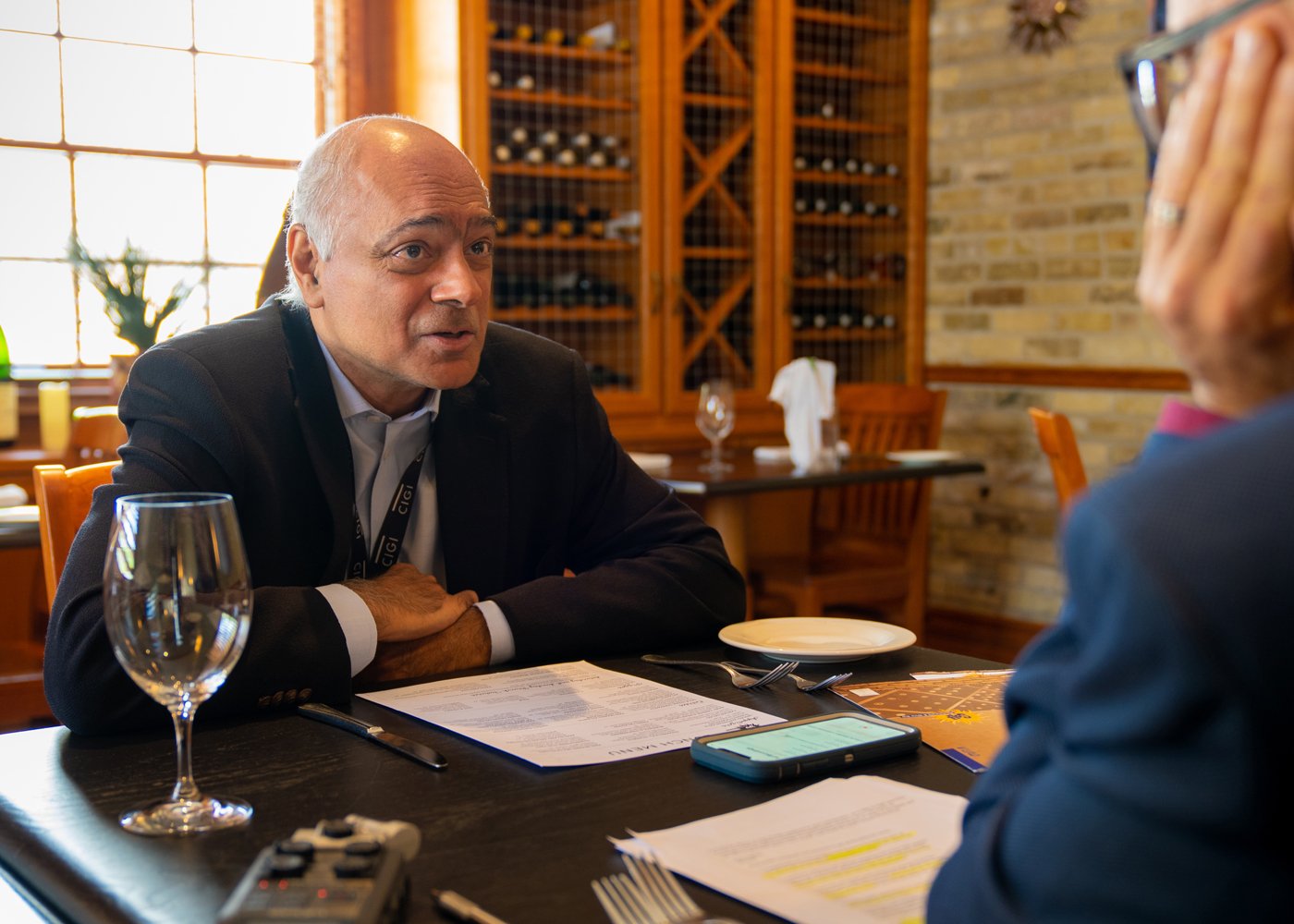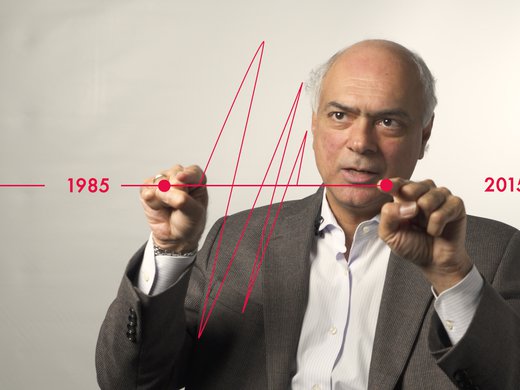Solé Restaurant and Wine Bar is nestled in an elegantly restored space featuring the exposed cream-yellow brick common to the buildings of the historic Seagram Distillery complex in downtown Waterloo, Ontario. Steps across the street from CIGI’s campus headquarters, it has for years been a favoured haunt and meeting place of CIGI president Rohinton P. Medhora, who completes an eventful, decade-long presidency of the organization on September 2, 2022.
On this particular day in early July, Medhora — a trim, 60-something man with salt-and-pepper hair and clad in navy blazer, collared pale blue shirt and casual dress slacks — is feeling upbeat and serene. It’s the midpoint of a busy Monday: he’s fresh from participating in a morning webcast in China, followed by a CIGI senior management meeting, and preparing for discussions that will take place that afternoon on the Ontario government’s right-to-disconnect legislation. Lunch at Solé, as always, is a working interlude.
He begins with an order, as is his habit when lunching here, for “cranberry juice, slice of lemon, no ice.” In matters culinary as well as professional, the international economist — an expert in monetary and trade policy, international relations and development economics — is meticulous, disciplined and precise, all traits that have stood him in good stead during his years of steering CIGI through an unprecedented period of transformation.
Asked whether there may be a parallel of sorts between the conviviality of a fine restaurant and the role of the think tank in society, he pauses thoughtfully.
“I have a group of people in the region — at the Balsillie School of International Affairs, at the university, in the community, the mayors, the MPPs, the MPs — and once a year or so, I come here with them,” Medhora recounts. “We always have a good catch-up. That’s the soft tissue that keeps a place like CIGI together.
“There’s something to that,” Medhora continues, referring to the restaurant analogy. “It’s the table where people come together to discuss things in a dispassionate way, with a bit of distance from their day-to-day preoccupations. It’s also a professional association. In other words, it’s a network of people working on the street to find solutions. And it straddles that space between policy, media and academia.”
In Medhora’s view, such policy fora are more critically important than ever before. He notes that legacy media is struggling, particularly print, and think tanks have stepped into the breach as those lines continue to blur. Organizations such as CIGI can provide invaluable non-partisan insight and policy innovation, as well as sober second thought.
As he considers the summation, just weeks away, of his years at the head of CIGI (he will transition to a role as a distinguished fellow and collaborator within the organization), Medhora is sanguine about what he and CIGI have achieved together, and where each is headed next.
“I’m happy about the space we’ve carved out for ourselves, which is ever-changing,” he says. He stresses that success in the role has required both flexibility and a consistent, coherent vision. “You know, we do a strategic plan, then along comes COVID, and along comes Ukraine. Does that mean we completely revisit our plan, in my view? No, but should we be guided by current events? Absolutely. And so, it’s that balance between agility and flexibility, on the one hand, and having a long-term plan that you’re following, on the other — a cadence — that, I think, I’m most proud of.”
The server returns to take food orders. After briefly considering an array of Mediterranean delicacies, Medhora settles on the Solé steak sandwich, with spiced watermelon and tomato gazpacho to start — clearly more long-standing favourites.
Then, not missing a beat, he digs into what’s actually uppermost in his mind today: the precarious health of the world’s multilateral institutions and the parlous state of globalization itself, as war rages in Ukraine, insurrection simmers in the United States and tensions rise in the Taiwan Strait.
From Medhora’s perspective — that of a scholar who has devoted his professional life to international diplomacy and governance — the current backlash is worrying, but not insuperable. Historical context, he says, makes him more optimistic than one might expect.
“I am not someone who thinks the global cooperation agenda is dead,” he says, taking a sip of cranberry juice. “I just think different formations are rising, but we’re saddled with an architecture that’s outdated. What we’re seeing is a clash between two formations, which looks messy, but take something like the Digital Economy Partnership Agreement that Singapore, Chile and New Zealand have signed and which Canada wishes to join. This is the shape of the future, in a number of ways.”
Medhora notes that most important ideas historically have had modest beginnings. He’s convinced, today more than ever, that the path to global progress leads through regional initiatives, innovation and multilateralism.
The meal arrives. Medhora remarks that his side order of crispy, curling French fries — “skinny fries,” as he calls them — are an indulgence he greatly enjoys, although, he adds with a chuckle, “my wife does not approve.” He samples one, pronounces it delicious, then launches back into his subject.
Optimism, he explains, does not blind him to the flaws or failings of the current era.
On the contrary: he’s been sharply critical of Western governments, including that of Canada, on the COVID-19 vaccine issue — specifically, the continuing failure of the world’s wealthiest nations to distribute vaccines equitably to countries in the Global South.
“This issue has tested my ample reservoirs of optimism,” he concedes.
For Medhora, vaccine equity is not only a matter of international aid or charity. It’s a question of sheer, pragmatic self-interest. “I don’t make the vaccine argument on the grounds of do good for others — I’m saying, also do it for yourself, your own interest,” he explains. “Chances are, we’ll have a rough fall and winter. Some new variant might emerge. Why? Because 80 percent of some parts of the world are still not vaccinated and that’s how variants come about. It leaves me deeply concerned.”
The failure of Western governments to lead effectively on vaccines presents challenges for those seeking solutions to other pressing international problems, he says.
“Suppose tomorrow you have a breakthrough technology to fight climate change, some kind of solar cell storage, a breakthrough on carbon sequestration. You’d assume that would make us collectively better off. Instead, we’ve designed a system that rations it out based on price and a whole bunch of political considerations.
“Let’s not mince words on this,” he adds. “The failure to broaden innovation to make sure that you’re not simply buying vaccines to give them as charity, but making sure that vaccine development and production happens everywhere — that has been a major failure of the last two years.”
CIGI chose to look forward and seize the initiative. That meant, to use a Canadian metaphor, skating to where the puck was headed. That path led inexorably to the organization’s current focus on data and the multiplicity of issues connected with it, Medhora says.
All of which is why, he explains, multilateral institutions and dialogue remain so essential. Medhora, who served on CIGI’s International Board of Governors prior to becoming president and before that led programs at Canada’s International Development Research Centre, is a strong believer in the idea that multilateralism is not intended for times of peace and plenty. Rather, it’s a response to crisis.
A case in point is the Group of Twenty (G20), which has a seminal place in CIGI’s history. An expansion of the Group of Seven model to include rising nations beyond the Atlantic powers, the institution of the G20 is often credited to former Canadian finance minister and prime minister Paul Martin. Martin himself has credited CIGI with catalyzing some of his thinking around the initiation of the Leaders’ Summit.
The G20 was an innovation, Medhora says, born of trouble and turmoil — specifically, the global financial crisis and ensuing Great Recession of 2008–2009. “In the end, it was the crisis that made the G20 Leaders’ Summit happen,” he says.
Today, crisis is again upon us — first the COVID-19 pandemic, then an invasion and war in Ukraine. As Medhora prepares to pass the torch to his successor, the survival of the G20 is in question. The international populist movement, pandemic and conflict have created profound uncertainty. “The next 12 months will be critical. And the world has never needed the G20 more than now.”
Ironically, CIGI’s early success with that body created unique challenges for the organization as Medhora was beginning his tenure as president in 2012. Specifically, he recalls, “What do you do for an encore?”
CIGI could have opted to rest on its laurels, becoming yet another organization devoted to tracking global summitry through various international meetings and conferences. “But there are other think tanks doing that work,” Medhora says, “including some in Canada. That didn’t make sense for CIGI, or for the private philanthropists who created it.”
CIGI chose to look forward and seize the initiative. That meant, to use a Canadian metaphor, skating to where the puck was headed. That path led inexorably to the organization’s current focus on data and the multiplicity of issues connected with it, Medhora says.
“We’ve maintained our roots, which is global summitry, global governance, international relations, Canada’s place in the world — but we’re now looking at it through this frame of digital governance,” he says. “And I think that’s a natural, dare I say organic, evolution for the organization.”
When asked what aspect of his work he has most relished, Medhora instantly responds: “The gang, the team. That’s the fun part.”
But it wasn’t all fun. There were challenges as well, especially at the beginning.
“I took over a CIGI that was in some turmoil,” he remembers, pausing for a sip of juice. “The board was fully behind having a new president who kind of brought things into a more systematic approach. But there were issues, including with personnel. It was change management. I enjoy doing this work, but it’s not fun. It’s hard. And I wouldn’t want to do that again.”
Medhora decided early in his tenure that he would professionalize CIGI’s structure and mission around an idea.
“If you have systemization without ideas, you basically have bureaucracy, right?” he says. “Welcome to government. So, it’s about systematizing it around a game plan. Our game plan is digital governance and then impact. It’s that gamut of things. Strategic thinking doesn’t require a lot of time. Operationalizing does. But in terms of importance, you can’t have one without the other.”
From the unifying focus on digital governance all else has flowed. For one thing, Medhora says, the organization’s fellowship structure became far more effective, functional and global.
“We don’t have fellows who are simply on the letterhead, as it were,” he says. “We make sure that not every month, but over a two- or three-year cycle, they’re contributing work, or they cycle out, and that’s natural.”
In an era when online disinformation and polarization have made policy discussions increasingly fraught, Medhora says, CIGI’s growing body of work is all the more vital. Among his abiding passions is the need for a Digital Stability Board: an assembly where the thicket of global digital problems — from disinformation to cyberespionage, privacy and data rights — can be addressed. He has likened the proposal for the Digital Stability Board to a new “Bretton Woods moment,” referring to the meetings in 1944 that established the postwar global economic order.
“It was that global conclave that included what we’d now call the developing South, which is also something we’re thinking about today,” Medhora says. “They created a structure: the International Monetary Fund, the World Bank, the GATT, and that structure has lasted to this day. That’s what Bretton Woods is — it’s people coming together with foresight and creating something that has lasted.”
Medhora contends that the emerging patchwork of global digital regulation requires just such a forum to introduce some coherence.
“There may be other things that are part of this, you know, a cybersecurity norm, a global statement on how we use data, new technologies. There’s a ton of things we could do. And ideally not after a prolonged war.”
He believes that, come what may, the digital agenda is here to stay.
“Even if CIGI had a different strategic plan, you couldn’t get away from it,” he says. “The global digital agenda bleeds from global through local and national. On any given local issue: take the Waterfront Toronto project — with which CIGI was not involved — it comprised digital platforms, privacy, the public good, new technologies, data governance.”
All this to say that Medhora is confident that CIGI is well positioned for the years ahead and indeed further out. If anything, he believes, data, digital and the attendant issues will become even more all-encompassing than they are today.
Although he’s careful not to make predictions on behalf of his successor, Paul Samson, Medhora shares that the two have had many discussions, and that he’s confident the torch is passing to a leader with steady hands. CIGI’s future direction, he thinks, will evolve organically from its current one.
“I think there’ll be a lot more national, local and regional stuff, which doesn’t fit the conventional international-affairs-school kind of curriculum but is essential,” he says. “I suspect CIGI will be doing a lot more on data innovations at the regional, multi-country level. This is where the action will be.”
As he contemplates semi-retirement, Medhora expects that the works of Charles Dickens, a favourite author, will occupy more of his time, as will travel to favourite destinations such as France, Italy, India and Japan. But he in no way speaks like a man about to slow down. If anything, he appears to be eagerly anticipating new projects.
He remains very interested in vaccine equity and the associated intellectual property issue, for example.
“It opens the door to discussions of national and global policy ethics, what’s our empathy level, all of that,” Medhora says. “I expect I’ll be doing more work on data governance, and specifically following on from my work on health and technology. There might be follow-up work on how to more effectively use big data to solve global health issues. Those are the two things I know will preoccupy me for some time.”
Will there be more time for tea, as well? Perhaps. A long-time tea aficionado, Medhora keeps at least four teapots in his office, and many more at home. The key, he says, is to match tea to teapot.
“I have one or two kinds of Darjeeling tea,” he says. “I like white tea. I always keep a white tea in my office. I certainly like Japanese green tea, and I’ve come to like the shade-grown green tea — it’s much more mellow. I always have Japanese tea balls. I keep rooibos. I keep ginseng as well.”
As lunch draws to a close, Medhora glances around the dining room at Solé, site of so many past CIGI functions and events. There’s no trace of wistfulness in his gaze. Rather, he seems content. Like CIGI itself, he’s looking forward — curious, engaged and anticipating the opportunities ahead.



